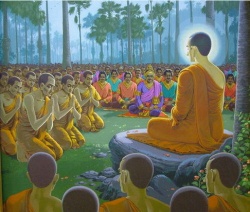Difference between revisions of "Four great heavenly kings"
m (Adminos moved page Four heavenly kings to Four great heavenly kings without leaving a redirect) |
|||
| Line 9: | Line 9: | ||
[http://www.sgilibrary.org/search_dict.php?SearchSelect=dict&p=5&m=1&in=2&q=Enlightenment www.sgilibrary.org] | [http://www.sgilibrary.org/search_dict.php?SearchSelect=dict&p=5&m=1&in=2&q=Enlightenment www.sgilibrary.org] | ||
[[Category:Buddhist Terms]] | [[Category:Buddhist Terms]] | ||
| − | + | ||
[[Category:Dhritarashtra]] | [[Category:Dhritarashtra]] | ||
[[Category:Virupaksha]] | [[Category:Virupaksha]] | ||
Revision as of 14:33, 2 June 2013
four heavenly kings
[四天王] (Jpn shi-tenno )
Also, four great heavenly kings. The lords of the four quarters who are said to serve the god Shakra as his generals and protect the four quarters of the world. They are Upholder of the Nation (Skt Dhritarashtra), who protects the east; Wide-Eyed (Virupaksha), who guards the west; Hearer of Many Teachings (also known as Vaishravana), who watches over the north; and Increase and Growth (Virudhaka), who defends the south. They are called the guardians of the world and are said to live halfway up the four sides of Mount Sumeru, on whose summit Shakra dwells. Their respective functions are to protect the world; to discern and punish evil and encourage the aspiration for enlightenment; to listen to the Buddhist teachings and protect the place where the Buddha expounds them; and to relieve people of their sufferings. Various sutras, such as the Golden Light Sutra, refer to them as guardians of Buddhism. In the ceremony of the Lotus Sutra, these four heavenly gods appear with their ten thousand retainer gods, and in the "Dharani" (twenty-sixth) chapter of the sutra, Hearer of Many Teachings and Upholder of the Nation pledge to protect those who embrace the sutra.
